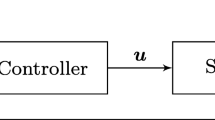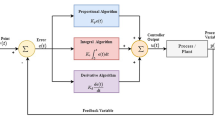Abstract
Model predictive control (MPC) is an optimal control method that predicts the future states of the system being controlled and estimates the optimal control inputs that drive the predicted states to the required reference. The computations of the MPC are performed at pre-determined sample instances over a finite time horizon. The number of sample instances and the horizon length determine the performance of the MPC and its computational cost. A long horizon with a large sample count allows the MPC to better estimate the inputs when the states have rapid changes over time, which results in better performance but at the expense of high computational cost. However, this long horizon is not always necessary, especially for slowly-varying states. In this case, a short horizon with less sample count is preferable as the same MPC performance can be obtained but at a fraction of the computational cost. In this paper, we propose an adaptive regression-based MPC that predicts the best minimum horizon length and the sample count from several features extracted from the time-varying changes of the states. The proposed technique builds a synthetic dataset using the system model and utilizes the dataset to train a support vector regressor that performs the prediction. The proposed technique is experimentally compared with several state-of-the-art techniques on both linear and non-linear models. The proposed technique shows a superior reduction in computational time with a reduction of about 35–65% compared with the other techniques without introducing a noticeable loss in performance.















Similar content being viewed by others
Code Availability
The code is available here https://github.com/ahmed-elliethy/fast-regression-mpc
Notes
We used the same H for all experiments.
A video that shows simulation for the vehicle controlled by the proposed ARMPC is shown in Sect. S.IV in the supplementary material.
References
Garcia, C. E., Prett, D. M., & Morari, M. (1989). Model predictive control: Theory and practice—A survey. Automatica, 25(3), 335–348.
Hrovat, D., Di Cairano, S., Tseng, H. E., & Kolmanovsky, I. V. (2012). The development of model predictive control in automotive industry: A survey. In 2012 IEEE international conference on control applications (pp. 295–302). IEEE.
Bakošová, M., & Oravec, J. (2014). Robust MPC of an unstable chemical reactor using the nominal system optimization. Acta Chimica Slovaca, 7(2), 87–93.
Wang, C., & Song, Z. (2018). Convex model predictive control for rocket vertical landing. In: 2018 37th Chinese control conference (CCC) (pp. 9837–9842). IEEE. https://doi.org/10.23919/ChiCC.2018.8483147
Song, D., Chang, Q., Zheng, S., Yang, S., Yang, J., & Joo, Y. H. (2020). Adaptive model predictive control for yaw system of variable-speed wind turbines. Journal of Modern Power Systems and Clean Energy, 9(1), 219–224.
Mostafa, E., Elliethy, A., & Aly, H. A. (2022). Response-time enhancement of a hybrid controller of unmanned aerial vehicles using parametrization. In: 2022 13th International conference on electrical engineering (ICEENG) (pp. 150–153). IEEE.
Maciejowski, J. M. (2002). Predictive control: With constraints. London: Pearson Education.
Khan, B., & Rossiter, J. A. (2013). Alternative parameterisation within predictive control: a systematic selection. International Journal of Control, 86(8), 1397–1409.
Muehlebach, M., & D’Andrea, R. (2019). A method for reducing the complexity of model predictive control in robotics applications. IEEE Robotics and Automation Letters, 4(3), 2516–2523.
Hyatt, P., Williams, C. S. & Killpack, M. D. (2020). Parameterized and GPU-parallelized real-time model predictive control for high degree of freedom robots. arXiv preprint arXiv:2001.04931
Funke, J., Brown, M., Erlien, S. M., & Gerdes, J. C. (2016). Collision avoidance and stabilization for autonomous vehicles in emergency scenarios. IEEE Transactions on Control Systems Technology, 25(4), 1204–1216.
Ogren, P., & Robinson, J. (2010). Receding horizon control of UAVs using gradual dense-sparse discretizations. In: AIAA guidance, navigation, and control conference (pp. 8084), Toronto, Ontario, Canada.
Kim, B.-A., Son, Y. S., Lee, S.-H., & Chung, C. C. (2013). Model predictive control using dual prediction horizons for lateral control. IFAC Proceedings Volumes, 46(10), 280–285.
Rezaei, A., & Burl, J. B. (2015). Effects of time horizon on model predictive control for hybrid electric vehicles. IFAC-PapersOnLine, 48(15), 252–256.
Kim, M., Lee, D., Ahn, J., Kim, M., & Park, J. (2021). Model predictive control method for autonomous vehicles using time-varying and non-uniformly spaced horizon. IEEE Access, 9, 86475–86487.
Shekhar, R. C., & Maciejowski, J. M. (2012). Robust variable horizon MPC with move blocking. Systems and Control Letters, 61(4), 587–594. https://doi.org/10.1016/j.sysconle.2012.02.004
Cagienard, R., Grieder, P., Kerrigan, E. C., & Morari, M. (2004). Move blocking strategies in receding horizon control. In: IEEE conference on decision and control (vol. 2, pp. 2023–20282). https://doi.org/10.1109/CDC.2004.1430345
Scokaert, P. O., & Mayne, D. Q. (1998). Min-max feedback model predictive control for constrained linear systems. IEEE Transactions on Automatic control, 43(8), 1136–1142.
Krener, A. J. (2018). Adaptive horizon model predictive control. IFAC-PapersOnLine, 51(13), 31–36.
Bemporad, A., Borrelli, F., & Morari, M. (2000). Piecewise linear optimal controllers for hybrid systems. In: American control conference (vol. 2, pp. 1190–1194). IEEE.
Bemporad, A., Morari, M., Dua, V., & Pistikopoulos, E. N. (2002). The explicit linear quadratic regulator for constrained systems. Automatica, 38(1), 3–20.
Alessio, A., & Bemporad, A. (2009). A survey on explicit model predictive control. Nonlinear Model Predictive Control (pp. 345–369). New York: Springer.
Pannocchia, G., Rawlings, J. B., & Wright, S. J. (2007). Fast, large-scale model predictive control by partial enumeration. Automatica, 43(5), 852–860.
Bøhn, E., Gros, S., Moe, S., & Johansen, T. A. (2021). Reinforcement learning of the prediction horizon in model predictive control. IFAC-PapersOnLine, 54(6), 314–320.
Bøhn, E., Gros, S., Moe, S., & Johansen, T.A. (2021). Optimization of the model predictive control meta-parameters through reinforcement learning. arXiv preprint arXiv:2111.04146
Sutton, R. S., & Barto, A. G. (2018). Reinforcement learning: An introduction. MIT Press.
Suzuki, K. (2013). Artificial neural networks: Architectures and applications. BoD-Books on Demand.
Gardezi, M. S. M., & Hasan, A. (2018). Machine learning based adaptive prediction horizon in finite control set model predictive control. IEEE Access, 6, 32392–32400.
Misin, M. (2020). Model predictive controller of a UAV using the LPV approach. Master’s thesis, Universitat Politècnica de Catalunya.
Najman, L., & Romon, P. (2017). Modern approaches to discrete curvature (Vol. 2184). New York: Springer.
Mallat, S. G. (1989). A theory for multiresolution signal decomposition: the wavelet representation. IEEE Transactions on Pattern Analysis and Machine Intelligence, 11(7), 674–693. https://doi.org/10.1109/34.192463
Gunn, S. R., et al. (1998). Support vector machines for classification and regression. ISIS Technical Report, 14(1), 5–16.
Vapnik, V. (1999). The nature of statistical learning theory. Springer.
Chorowski, J., Wang, J., & Zurada, J. M. (2014). Review and performance comparison of SVM-and ELM-based classifiers. Neurocomputing, 128, 507–516.
Daubechies, I. (1992). Ten lectures on wavelets. Philadelphia: SIAM.
Kim, Y., & Bang, H. (2018). Introduction to Kalman filter and its applications. In F. Govaers (Ed.), Introduction and implementations of the Kalman filter. Chap. 2. IntechOpen. https://doi.org/10.5772/intechopen.80600
Geletu, A. (2007). Solving optimization problems using the matlab optimization toolbox-a tutorial. TU-Ilmenau, Fakultät für Mathematik und Naturwissenschaften
Author information
Authors and Affiliations
Corresponding author
Ethics declarations
Conflict of interest
The author declares no competing interests.
Supplementary Information
Below is the link to the electronic supplementary material.
Rights and permissions
Springer Nature or its licensor (e.g. a society or other partner) holds exclusive rights to this article under a publishing agreement with the author(s) or other rightsholder(s); author self-archiving of the accepted manuscript version of this article is solely governed by the terms of such publishing agreement and applicable law.
About this article
Cite this article
Mostafa, E., Aly, H.A. & Elliethy, A. Fast adaptive regression-based model predictive control. Control Theory Technol. 21, 555–570 (2023). https://doi.org/10.1007/s11768-023-00153-y
Received:
Revised:
Accepted:
Published:
Issue Date:
DOI: https://doi.org/10.1007/s11768-023-00153-y




